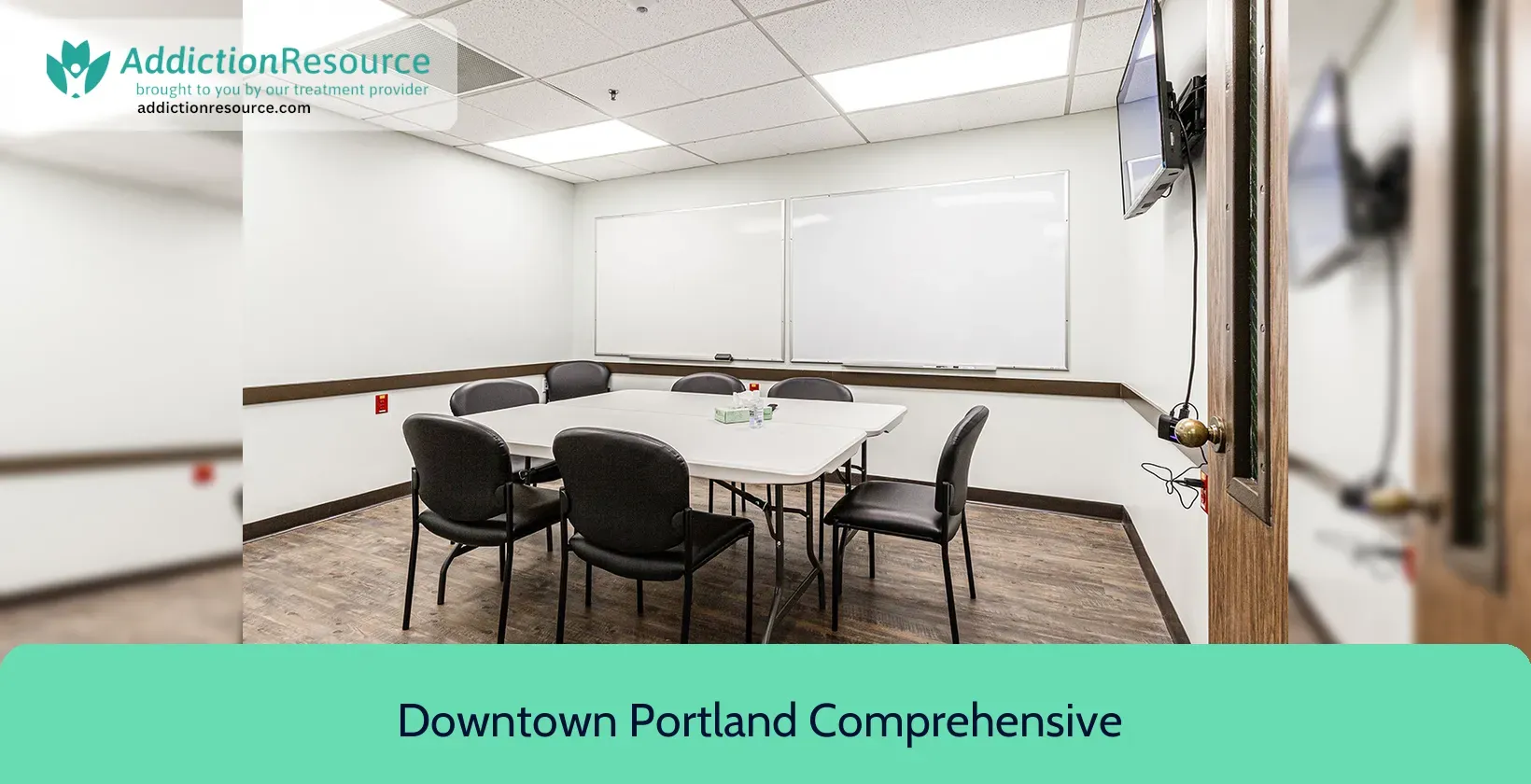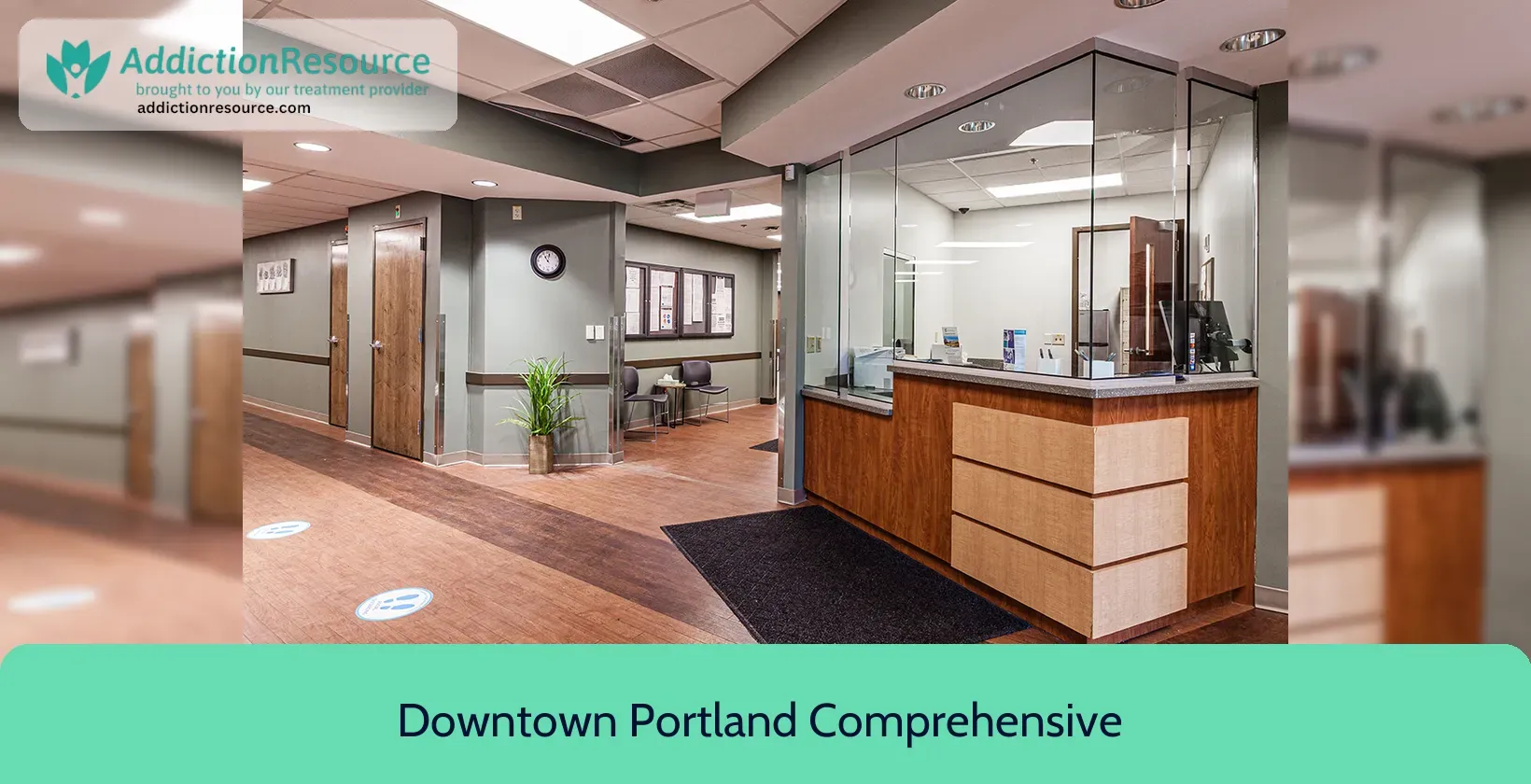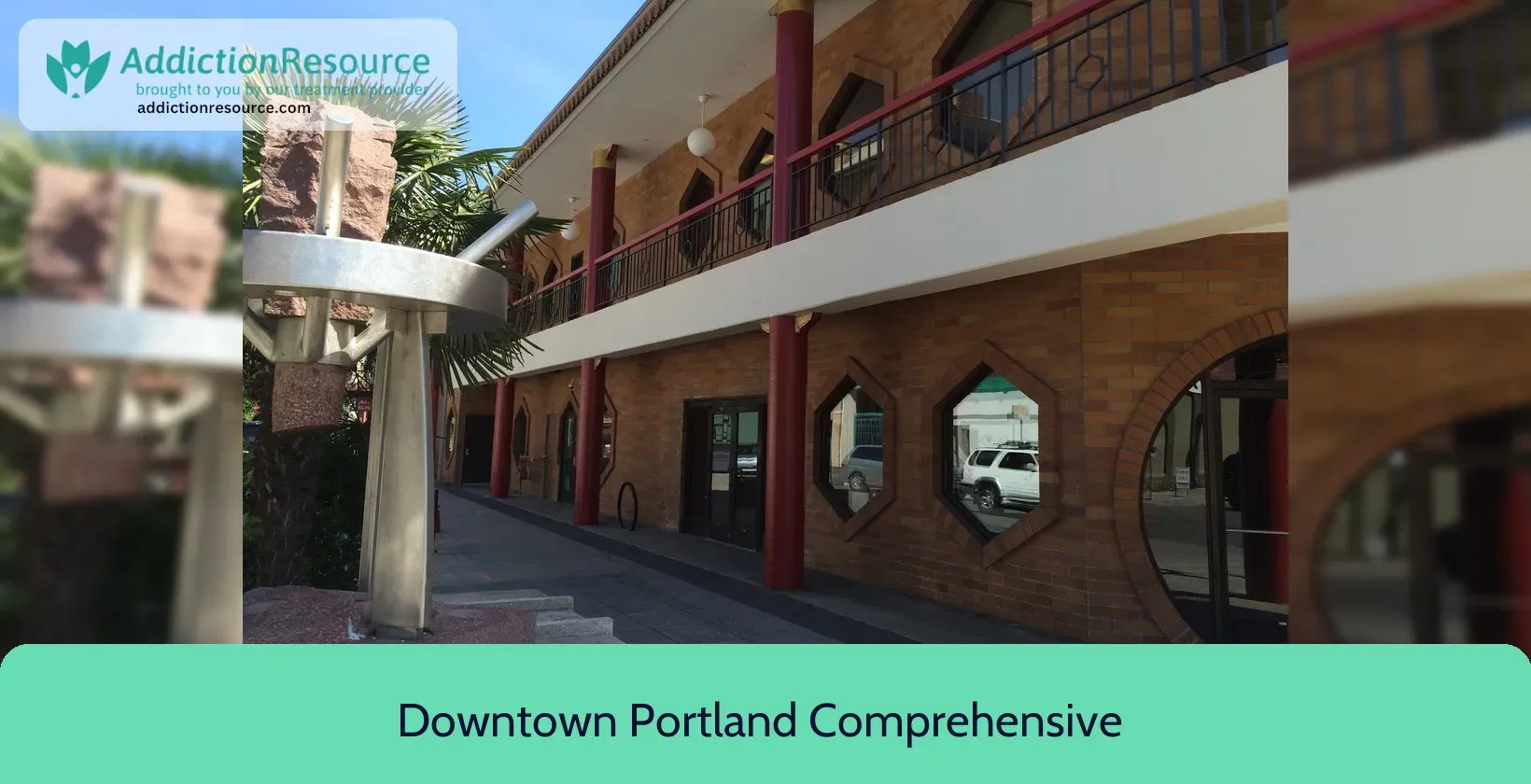Downtown Portland Comprehensive Treatment Center – Portland, Oregon in Portland Overview
Hope Without Commitment
Find the best treatment options. Call our free and confidential helpline
Most private insurances accepted
Treatment Options
The facility offers multiple levels of care, such as:
- Discharge Planning
- Employment counseling or training
- Outcome follow-up after discharge
The center treats the following addictions and co-occurring disorders:
- Clients with co-occurring mental and substance use disorders
- Veterans
- Active duty military
- Members of military families
- Criminal justice (other than DUI/DWI)/Forensic clients
- Pregnant/postpartum women
- Clients with HIV or AIDS
- Clients who have experienced trauma
- Clients who have experienced sexual abuse
- Clients who have experienced intimate partner violence, domestic violence
- Clients with co-occurring pain and substance use disorders
- Screening for tobacco use
- Comprehensive substance use assessment
- Interim services for clients
- Outreach to persons in the community
- Screening for substance use
- Complete medical history/physical exam
Treatment Modalities
Cognitive Behavioral Therapy (CBT) is a form of psychotherapy that emphasizes the critical role of thinking in how we feel and what we do. It aims to identify and challenge distorted or negative thought patterns and behaviors, teaching individuals to replace them with more constructive and rational beliefs. CBT is evidence-based and has been shown to be effective in treating a variety of psychological disorders, including depression, anxiety, and phobias, among others.
Telehealth Therapy is a level of care that offers psychological counseling and therapeutic services to individuals via digital platforms, such as video conferencing, phone calls, or messaging apps. This approach allows clients to connect with qualified therapists remotely, providing increased accessibility, flexibility, and convenience, especially for those who may have mobility issues, live in remote areas, or prefer the comfort of their own environment. By leveraging technology, Telehealth Therapy bridges the gap between patients and mental health professionals, ensuring continuity of care irrespective of physical distances.
Substance use disorder counseling treatment modalities refer to various approaches and methods used in the counseling and treatment of individuals with substance use problems. This can include individual therapy, group therapy, cognitive behavioral therapy, motivational interviewing, family therapy, and 12-step programs. The goal is to help the individual overcome their substance use, develop healthy coping skills, and lead a fulfilling life in recovery.
Trauma therapy addresses the underlying emotional and psychological wounds that may contribute to an individual’s substance abuse. Through a combination of psychotherapy and coping strategies, individuals are aided in processing past traumatic experiences, understanding the impact of trauma on their current behavior, and developing healthier coping mechanisms. This holistic approach fosters resilience, aids in the resolution of trauma, and is fundamental in supporting individuals on their path toward sustained recovery from addiction.
Vaping Cessation Counseling is a specialized form of support designed to help individuals overcome their dependence on electronic cigarettes or vaping products. Through evidence-based strategies, personalized advice, and emotional support, counselors guide individuals towards a nicotine-free life, emphasizing the long-term health benefits of cessation.
Group Therapy is a therapeutic space where individuals battling addiction come together to share experiences, gain insights, and support one another on their journey to recovery. Facilitated by trained professionals, this setting fosters communal healing and empowers participants to overcome the challenges of addiction through collective strength and understanding.
Intervention services assist families and friends of addicts in orchestrating an intervention, a meeting where concerned individuals express their worries and urge the addict to seek treatment. Expert interventionists aid in planning, assembling, and conversing with the affected individual. They direct participants on how to convey the adverse effects of the addict’s actions and emphasize the need for external assistance to tackle the addiction. The ultimate goal of an intervention is to encourage the addict to enter rehab and receive the necessary help.
Contingency management and motivational incentives are evidence-based treatment modalities used in addiction and behavioral health programs. Contingency management involves the use of rewards to reinforce positive behaviors and change negative behaviors, while motivational incentives provide incentives to engage in treatment and sustain recovery. Both approaches are designed to increase motivation and engagement in treatment and have been shown to be effective in promoting positive outcomes.
Motivational Interviewing (MI) in addiction treatment is a client-centered counseling approach designed to enhance an individual’s intrinsic motivation to change. By addressing ambivalence and tapping into personal values, MI fosters meaningful conversations about substance use and promotes commitment to recovery-focused goals.
Anger Management is a therapeutic approach aimed at helping individuals recognize the triggers and signs of their anger and teaching them effective ways to calm down and deal with the situations in a positive manner. Through a blend of counseling, cognitive-behavioral therapy, and practical skill development, individuals learn to reduce aggressive responses, improve communication, and enhance interpersonal relationships, contributing to a better quality of life.
The Matrix Model involves clients in group and individual counseling, psychoeducation, and skill-building exercises to boost self-awareness, coping skills, and overall well-being. It prioritizes creating a supportive and collaborative therapeutic environment, motivating active client participation in addressing addiction’s physical, emotional, and social dimensions. This model integrates evidence-based treatments like cognitive-behavioral therapy, 12-step facilitation, family education, and relapse prevention into a comprehensive program.
Community Reinforcement + Vouchers is an evidence-based intervention strategy designed to treat substance use disorders. It combines behavioral therapy with a voucher-based system that rewards individuals for substance-free urine tests. This approach encourages individuals to reduce or abstain from drug use by emphasizing positive reinforcement, skill-building, and tangible incentives, fostering healthier life choices and improved community relations.
The Relapse Prevention Model is a cognitive-behavioral approach aimed at minimizing or preventing relapses in individuals recovering from addictive behaviors. It incorporates strategies for recognizing and managing high-risk situations and triggers, enhancing self-efficacy, and developing coping skills. Through education, awareness, and self-monitoring, individuals are empowered to maintain their progress and avoid reverting to unhealthy behaviors. This model is essential in promoting long-term recovery and supporting individuals on their journey towards a substance-free life.
Individual Psychotherapy provides a private, one-on-one setting where clients can explore and address their personal challenges, behaviors, and feelings related to addiction and recovery. With the guidance of a trained therapist, clients work to uncover the root causes of their substance use, develop coping strategies, and build a foundation for long-term recovery and personal growth.
Conditions Treated
Alcoholism
Alcohol addiction is a condition where a person’s brain gets used to having alcohol, making it hard for them to control their drinking. This can lead to feeling down, acting without thinking, wanting alcohol strongly, and feeling sick if they don’t drink. To help with this, treatment programs are available. These usually include a guided process to safely stop drinking, talking with professionals to work through problems, and joining support groups with others facing similar issues. While these treatments can’t fully cure the addiction, they provide tools and support to help individuals live a better life and keep their drinking under control.
Substance use treatment
Substance use rehabilitation is a comprehensive treatment approach designed to assist individuals struggling with addiction to drugs or alcohol. This form of rehabilitation addresses both the physical dependency, often starting with detoxification, and the psychological triggers, using various therapeutic methods. The objective is to empower individuals to achieve and maintain sobriety, while equipping them with the tools and coping strategies needed to reintegrate into society and lead a substance-free life.
Levels Of Care
Outpatient
Outpatient programs are designed for individuals in stable medical condition with a low risk of relapse, often those who’ve completed inpatient treatment. These programs extend the foundation of prior treatment approaches, offering continuous addiction guidance and resources for sustained recovery. For those transitioning straight from detox, medical and psychological assessments are typically conducted, leading to the development of individualized treatment strategies. The majority of outpatient rehab centers provide diverse care levels, customized to each client’s unique requirements.
Outpatient methadone/buprenorphine or naltrexone treatment
Methadone maintenance treatment (MMT) is a comprehensive treatment program for individuals with opioid use disorder. It involves the long-term prescribing of methadone, a synthetic opioid, to patients in an effort to reduce or eliminate their use of illicit opioids, such as heroin. When provided at an appropriate dose and in conjunction with counseling and other support services, MMT can help to stabilize patients’ lives, reduce illicit drug use, and lower the risks of drug-related harm, such as overdose and transmission of infectious diseases.
Aftercare
Finishing a drug or alcohol rehab program is not the conclusion of substance abuse treatment but rather a pivotal step toward long-term recovery. Aftercare encompasses devising a sustainable recovery plan coupled with enduring support. It may include sober living environments such as halfway houses, career counseling, and connecting patients with community support programs like Alcoholics Anonymous (AA) or Narcotics Anonymous (NA). This holistic approach ensures a smooth transition into a substance-free life while bolstering resilience against relapse.
Payment Options
- Cash or self-payment
- Medicaid
- Medicare
- State-financed health insurance plan other than Medicaid
- Private health insurance
- Federal, or any government funding for substance use treatment programs
- Sliding fee scale (fee is based on income and other factors)
- SAMHSA funding/block grants
License and Accreditation
- State department of health
- Drug Enforcement Agency (DEA)
- Commission on Accreditation of Rehabilitation Facilities (CARF)
- SAMHSA certification for opioid treatment program (OTP)
- NAATP
Ancillary Services
- Case management service
- Social skills development
- Opioid use disorder clients only

 Authored by
Authored by  Reviewed by
Reviewed by 




